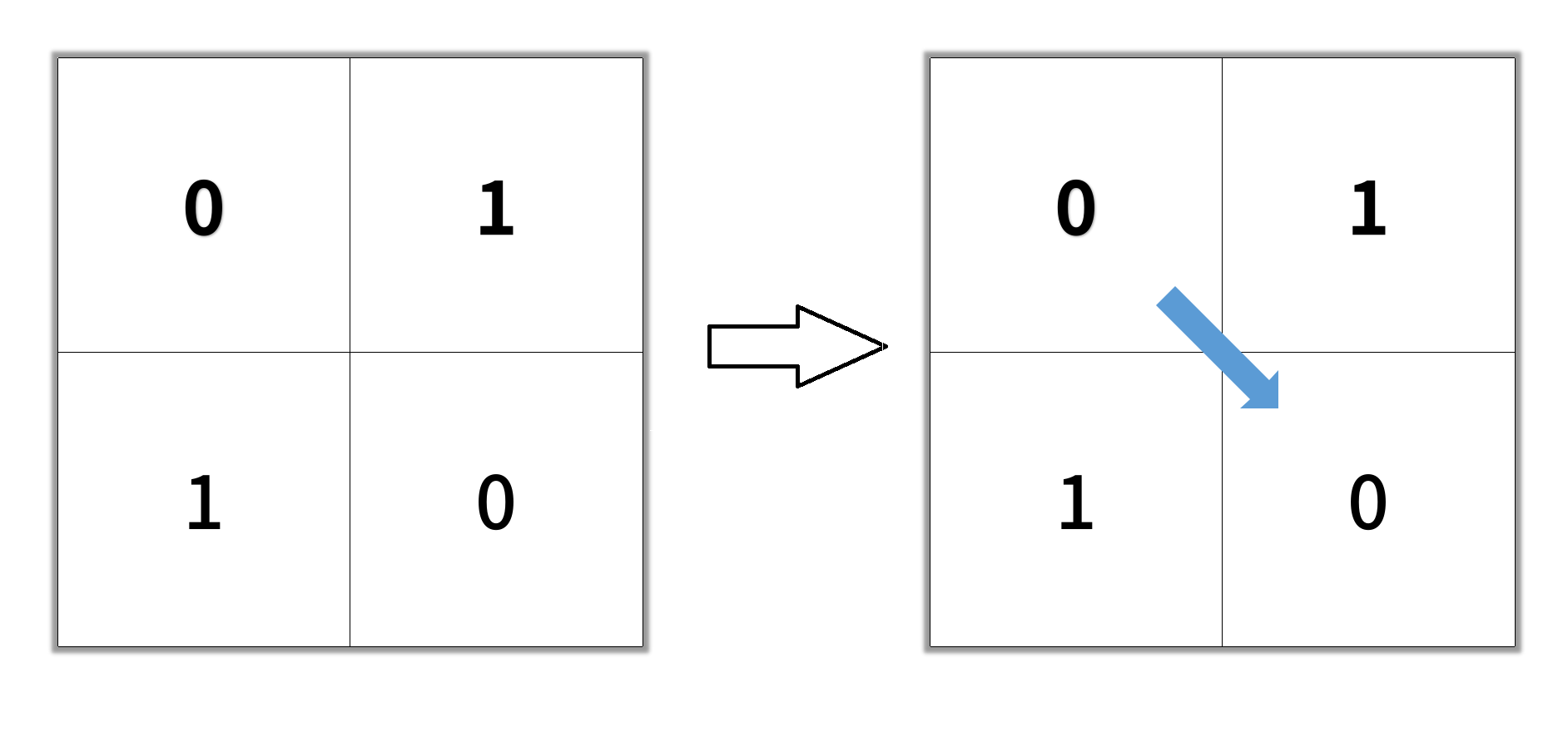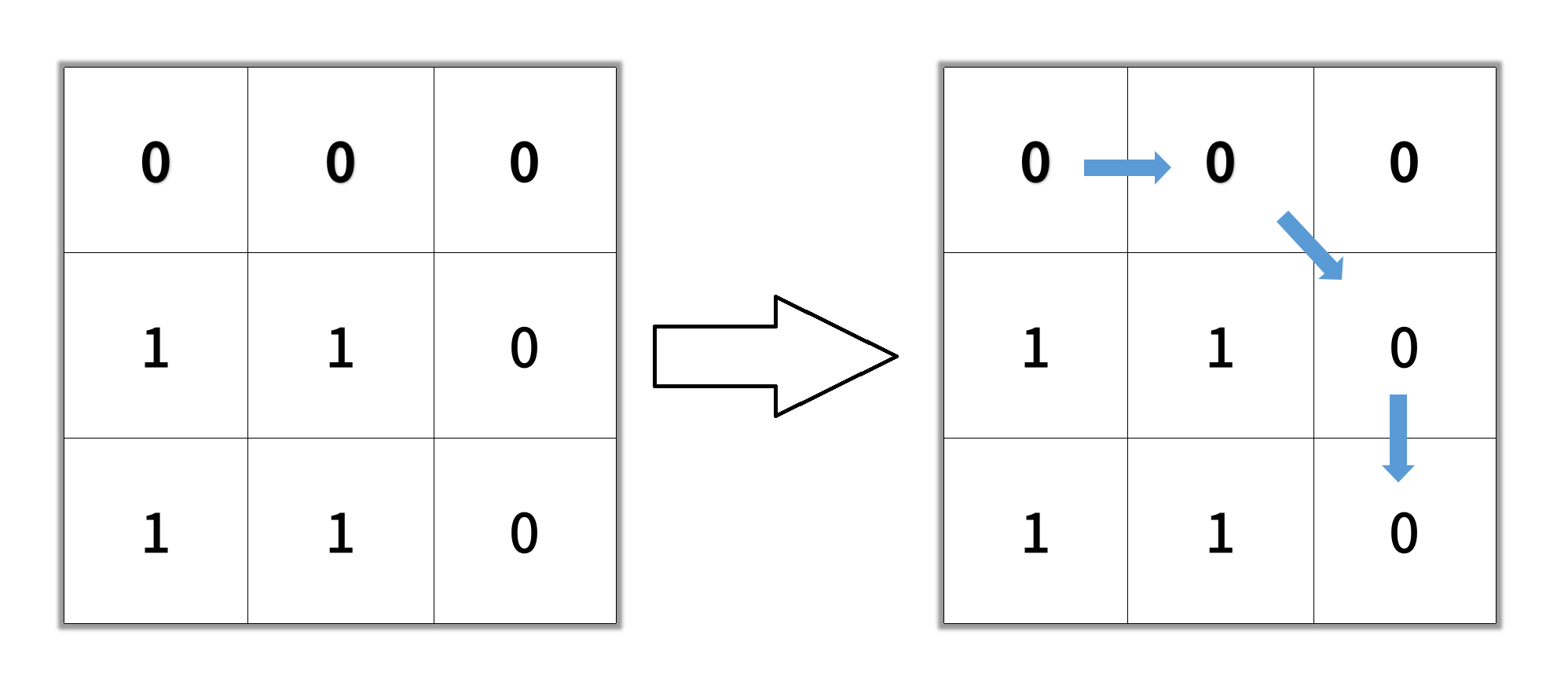[LeetCode] 1091. Shortest Path in Binary Matrix
Given an n x n binary matrix grid, return the length of the shortest clear path in the matrix. If there is no clear path, return -1.
A clear path in a binary matrix is a path from the top-left cell (i.e., (0, 0)) to the bottom-right cell (i.e., (n - 1, n - 1)) such that:
- All the visited cells of the path are
0. - All the adjacent cells of the path are 8-directionally connected (i.e., they are different and they share an edge or a corner).
The length of a clear path is the number of visited cells of this path.
Example 1:

Input: grid = [[0,1],[1,0]] Output: 2
Example 2:

Input: grid = [[0,0,0],[1,1,0],[1,1,0]] Output: 4
Example 3:
Input: grid = [[1,0,0],[1,1,0],[1,1,0]] Output: -1
Constraints:
n == grid.lengthn == grid[i].length1 <= n <= 100grid[i][j] is 0 or 1
二进制矩阵中的最短路径。
给你一个 n x n 的二进制矩阵 grid 中,返回矩阵中最短 畅通路径 的长度。如果不存在这样的路径,返回 -1 。
二进制矩阵中的 畅通路径 是一条从 左上角 单元格(即,(0, 0))到 右下角 单元格(即,(n - 1, n - 1))的路径,该路径同时满足下述要求:
路径途经的所有单元格都的值都是 0 。
路径中所有相邻的单元格应当在 8 个方向之一 上连通(即,相邻两单元之间彼此不同且共享一条边或者一个角)。
畅通路径的长度 是该路径途经的单元格总数。来源:力扣(LeetCode)
链接:https://leetcode.cn/problems/shortest-path-in-binary-matrix
著作权归领扣网络所有。商业转载请联系官方授权,非商业转载请注明出处。
跟大部分的 flood fill 的题型类似,这是一道给一个起点然后问你是否能到达终点的题目。这道题的起点和终点分别是 matrix 的左上角和右下角,无非是这道题的 traverse 的规则是可以往八个方向走,一般的题是只能往四个方向走。同时注意 clear path 的定义是路径上符合题意的单元格(0)的总数,如果你遇到任何坐标值为 1 的点,那就不能走。如果起点或终点的坐标值已经是 1 的话,直接就可以返回了,这是一个 corner case。其他部分就是正常 BFS 题目的翻版,如果不理解可以先做其他 flood fill 的题。
时间O(mn)
空间O(mn) - visited matrix
Java实现
1 class Solution { 2 int[][] dirs = new int[][] { { 1, 0 }, { -1, 0 }, { 0, 1 }, { 0, -1 }, { -1, 1 }, { -1, -1 }, { 1, 1 }, { 1, -1 } }; 3 4 public int shortestPathBinaryMatrix(int[][] grid) { 5 int m = grid.length; 6 int n = grid[0].length; 7 // corner case 8 if (grid[0][0] == 1 || grid[m - 1][n - 1] == 1) { 9 return -1; 10 } 11 // normal case 12 int count = 0; 13 boolean[][] visited = new boolean[m][n]; 14 visited[0][0] = true; 15 Queue<int[]> queue = new LinkedList<>(); 16 queue.offer(new int[] { 0, 0 }); 17 while (!queue.isEmpty()) { 18 int size = queue.size(); 19 for (int i = 0; i < size; i++) { 20 int[] cur = queue.poll(); 21 if (cur[0] == m - 1 && cur[1] == n - 1) { 22 return count + 1; 23 } 24 for (int k = 0; k < 8; k++) { 25 int nextX = cur[0] + dirs[k][0]; 26 int nextY = cur[1] + dirs[k][1]; 27 if (nextX < 0 || nextX >= m || nextY < 0 || nextY >= n || visited[nextX][nextY] == true 28 || grid[nextX][nextY] == 1) { 29 continue; 30 } 31 queue.offer(new int[] { nextX, nextY }); 32 visited[nextX][nextY] = true; 33 } 34 } 35 count++; 36 } 37 return -1; 38 } 39 }
二刷再提供一个不需要额外空间的做法。我将已经遍历过的坐标标记成 1,等同于不能走。
时间O(mn)
空间O(1)
Java实现
1 class Solution { 2 public int shortestPathBinaryMatrix(int[][] grid) { 3 int m = grid.length; 4 int n = grid[0].length; 5 // corner case 6 if (grid[0][0] == 1 || grid[m - 1][n - 1] == 1) { 7 return -1; 8 } 9 10 // normal case 11 int[][] dirs = new int[][] { { 1, 0 }, { -1, 0 }, { 0, 1 }, { 0, -1 }, { -1, 1 }, { -1, -1 }, { 1, 1 }, { 1, -1 } }; 12 int step = 0; 13 Queue<int[]> queue = new LinkedList<>(); 14 queue.offer(new int[] { 0, 0 }); 15 grid[0][0] = 1; 16 while (!queue.isEmpty()) { 17 int size = queue.size(); 18 for (int i = 0; i < size; i++) { 19 int[] cur = queue.poll(); 20 int x = cur[0]; 21 int y = cur[1]; 22 if (x == m - 1 && y == n - 1) { 23 return step + 1; 24 } 25 for (int k = 0; k < 8; k++) { 26 int newX = x + dirs[k][0]; 27 int newY = y + dirs[k][1]; 28 if (newX >= 0 && newX < m && newY >= 0 && newY < n && grid[newX][newY] == 0) { 29 grid[newX][newY] = 1; 30 queue.offer(new int[] { newX, newY }); 31 } 32 } 33 } 34 step++; 35 } 36 return -1; 37 } 38 }




 浙公网安备 33010602011771号
浙公网安备 33010602011771号